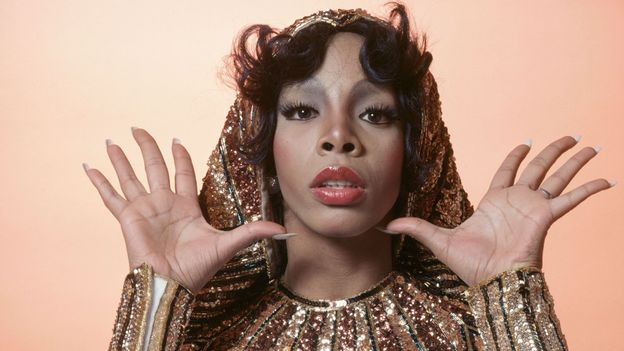The diva who changed dance music


“I Feel Love is undoubtedly one of the most influential records of all time,” says Luke Howard of globally renowned club collective Horse Meat Disco. “But, even if you take it away from Summer’s back catalogue, she’s still one of the most successful solo female recording artists of all time.” Though Summer’s career peaked commercially during the late 1970s as disco conquered the mainstream, she continued to score hits after the genre fell out of favour. Its commercial decline was hastened by the Disco Sucks movement led by mainly white rock fans who felt threatened by the success of a genre rooted in the black and queer underground. Fuelled by latent racism and homophobia, it reached a toxic apex on 12 July 1979, the infamous Disco Demolition Night, when thousands congregated in a Chicago baseball field to detonate crates of disco records in a grim publicity stunt.
Given how synonymous Summer had become with disco, it is impressive that she continued to score hits through the subsequent decade – most notably 1983’s new wave gem She Works Hard for the Money and 1989’s spangly pop banger This Time I Know It’s for Real. Nearly a decade after her death, even relatively obscure Summer songs are catnip for contemporary DJ-producers: the likes of Junior Vasquez, Oliver Nelson and Ladies On Mars have just queued up to remix tracks from I’m a Rainbow, a so-called “lost” album that her record company shelved in 1981, because they felt its disco sound was passé, and wanted Summer to transition to a more R&B-oriented style.
Titled I’m a Rainbow: Recovered and Recoloured, this new release highlights the timelessness of Summer’s voice. Hearing her glide over Ladies On Mars’ turbo-charged beat on his thumping update of Leave Me Alone is thrilling, especially when she delivers the empowering pay-off line: “I’ll never belong to you or any other man”. The original album’s co-producer Pete Bellotte blames its fate on Summer’s then-label boss, David Geffen. “I never understood why he signed her in the first place because he hated disco music,” he says. “He was a fantastic guy, but in my opinion he was totally the wrong person for her.” Still, Bellotte says he didn’t sulk for too long at the time because a track from the album, Romeo, later earned a “nice sum of money” for all involved when it appeared on 1983’s hugely successful Flashdance movie soundtrack.
More than the Queen of Disco
Writer and podcaster Ira Madison III, who a few years ago compiled a definitive guide to Summer’s music for VICE, points out that Summer’s discography also includes rock anthems such as the strutting 1979 chart-topper Hot Stuff and “some incredible gems of R&B music”. Indeed, one of her most gleaming R&B diamonds, 1982’s Love Is in Control (Finger on the Trigger), was produced by Quincy Jones the same year he worked on Michael Jackson’s Thriller: a sure sign of Summer’s cachet at the time. “Of course it’s easy to pigeonhole black artists into one genre, and while she wasn’t as influential in her other genre forays outside of disco, this work is very representative of her incredible range as an artist,” says Madison III.








